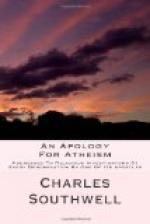knowledge, and affect contempt for all that concerns
most intimately our ’earthly tabernacles.’
Bacon taught us to consider as suspicious every
relation, which depends in any degree upon religion,
[93:1] but wiser than that ‘wisest of mankind,’
our real Christians execrate such teaching,
and will have nothing good to do with those
who walk in the light and honestly act in the spirit
of it. How dare they then pretend to sympathise
with the opinions of Bacon? It is true he announced
himself willing to swallow all the fables of the Talmud
or the Koran, rather than believe this Almighty frame
without a Mind; but who is now prepared to determine
the precise sense in which our illustrious philosopher
used the words ‘without a mind.’
We believe his own interpretation altogether unchristian.
‘To palter in a double sense’ has ever
been the practice of philosophers who, like Bacon,
knew more than they found it discreet to utter.
But with all their discretion, Locke, Milton, and even
Newton did not succeed in establishing an orthodox
reputation. The passages from Locke given in
this Apology do at least warrant our opinion that it
may fairly be doubted whether he was either a Christian
or a Theist. Had he been disposed to avow Atheistical
sentiments, he could not have done so, except at the
imminent hazard of his life. Speculative philosophers
do not usually covet the crown of martyrdom, and are
seldom unwilling to fling down a few religious sops
to the Cerberus of popular bigotry. It was the
boast of Synesius, Bishop of Ptolemais, that when communing
with himself, he was always a philosopher, but when
dealing with the mass of mankind, he was always a
priest. Who knows how far John Locke followed
the safe example. That he was a materialist
his writings prove; and every far sighted Theist will
admit that Atheism is the natural termination of Materialism.
John Locke may have been a devout believer in ‘thingless
names,’ to which no merely human creature can
attach clear and distinct ideas: he may have
thought the Bible had one of the said ‘thingless
names’ for its author, salvation for its end,
and truth without mixture of error for its matter;
though very probable he affected such belief, to shield
himself from persecution; but it is quite certain,
and may be affirmed without injustice, that he should
to have professed Atheism; for his own rule of philosophising
is inconsistent with belief in any thing supernatural.
While living he was often charged with Atheism, by
opponents who understood the tendencies of his philosophy
better than he appeared to do himself. But the
Author of this Apology has no such mean opinion of
John Locke, as to suppose him ignorant that Materialism,
as he taught it, is totally irreconcileable with that
God, and that Religion in which he professed to believe.
Belief in inconceivable entities cannot be reconciled
with disbelief of all entities, save those of which
we can frame clear and distinct ideas. Nor is
it easy to persuade oneself that Locke could so far
have done violence to his own principles as to feel
‘lively faith’ in a ‘science’
with no other aim, end, or ground-work, than ’the
knowledge and attributes of the unknown.’




